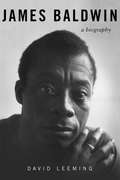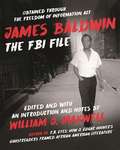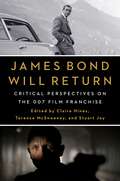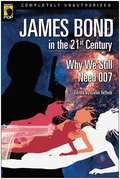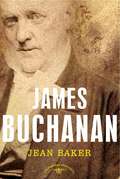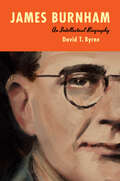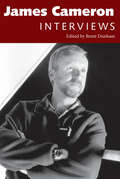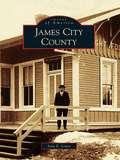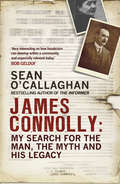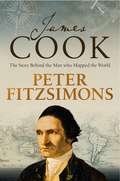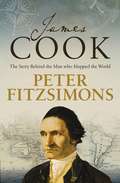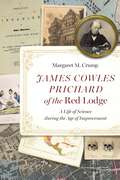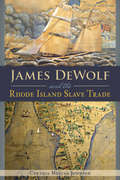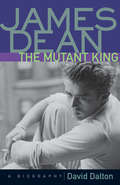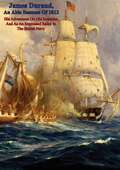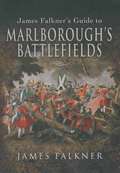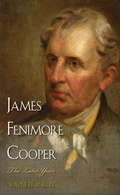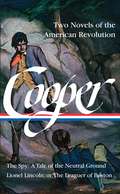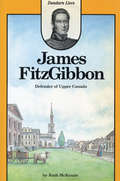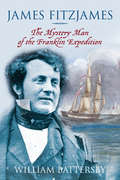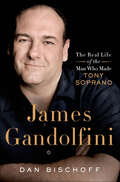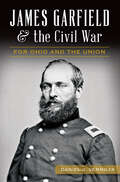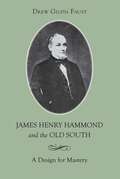- Table View
- List View
James Baldwin: A Biography
by David LeemingJames Baldwin was one of the great writers of the last century. In works that have become part of the American canon-Go Tell It on a Mountain, Giovanni’s Room, Another Country, The Fire Next Time, and The Evidence of Things Not Seen-he explored issues of race and racism in America, class distinction, and sexual difference. A gay, African American writer who was born in Harlem, he found the freedom to express himself living in exile in Paris. When he returned to America to cover the Civil Rights movement, he became an activist and controversial spokesman for the movement, writing books that became bestsellers and made him a celebrity, landing him on the cover of Time.In this biography, which Library Journal called "indispensable,” David Leeming creates an intimate portrait of a complex, troubled, driven, and brilliant man. He plumbs every aspect of Baldwin’s life: his relationships with the unknown and the famous, including painter Beauford Delaney, Richard Wright, Lorraine Hansberry, Marlon Brando, Harry Belafonte, Lena Horne, and childhood friend Richard Avedon; his expatriate years in France and Turkey; his gift for compassion and love; the public pressures that overwhelmed his quest for happiness, and his passionate battle for black identity, racial justice, and to "end the racial nightmare and achieve our country.”Skyhorse Publishing, along with our Arcade, Good Books, Sports Publishing, and Yucca imprints, is proud to publish a broad range of biographies, autobiographies, and memoirs. Our list includes biographies on well-known historical figures like Benjamin Franklin, Nelson Mandela, and Alexander Graham Bell, as well as villains from history, such as Heinrich Himmler, John Wayne Gacy, and O. J. Simpson. We have also published survivor stories of World War II, memoirs about overcoming adversity, first-hand tales of adventure, and much more. While not every title we publish becomes a New York Times bestseller or a national bestseller, we are committed to books on subjects that are sometimes overlooked and to authors whose work might not otherwise find a home.
James Baldwin: The FBI File
by William J. MaxwellAvailable in book form for the first time, the FBI's secret dossier on the legendary and controversial writer. Decades before Black Lives Matter returned James Baldwin to prominence, J. Edgar Hoover’s FBI considered the Harlem-born author the most powerful broker between black art and black power. Baldwin’s 1,884-page FBI file, covering the period from 1958 to 1974, was the largest compiled on any African American artist of the Civil Rights era. This collection of once-secret documents, never before published in book form, captures the FBI’s anxious tracking of Baldwin’s writings, phone conversations, and sexual habits?and Baldwin’s defiant efforts to spy back at Hoover and his G-men.James Baldwin: The FBI File reproduces over one hundred original FBI records, selected by the noted literary historian whose award-winning book, F.B. Eyes: How J. Edgar Hoover’s Ghostreaders Framed African American Literature, brought renewed attention to bureau surveillance. William J. Maxwell also provides an introduction exploring Baldwin's enduring relevance in the time of Black Lives Matter along with running commentaries that orient the reader and offer historical context, making this book a revealing look at a crucial slice of the American past?and present.
James Bond Will Return: Critical Perspectives on the 007 Film Franchise
by Claire Hines, Terence McSweeney, and Stuart JoyFor over six decades, James Bond has been a fixture of global culture, universally recognizable by the films’ combination of action set pieces, sex, political intrigue, and outrageous gadgetry. But as the British Empire entered the final stages of collapse, as the Cold War wound down and the “War on Terror” began, and as the visions of masculinity and femininity the series presented began to strike many viewers as outdated, the Bond formula has adapted to the changing times. Spanning the franchise’s entire history, from Sean Connery’s iconic swagger to Daniel Craig’s rougher, more visceral interpretation of the superspy, James Bond Will Return offers both academic readers and fans a comprehensive view of the series’s transformations against the backdrop of real-world geopolitical intrigue and sweeping social changes.Leading scholars consider each of the twenty-five films in the series, showing how and why Bond has changed and what elements of the formula have stood the test of time. Each chapter examines a single film from a distinct position, giving readers a full picture of the variety and breadth of the longest-running series in cinema history. Close formal readings; production histories; tracings of the political, social, and historical influences; analyses of the series’ use of then-new filmmaking technologies; reflections on the star personas that have been built around the character—these and many more approaches combine to produce a wide-ranging view of the James Bond film franchise. Essential reading for Bond scholars and aficionados alike, James Bond Will Return brings out the many surprising complexities of an iconic character.
James Bond in the 21st Century: Why We Still Need 007 (Smart Pop Ser.)
by Glenn YeffethThe staying power of the world's most dashing secret agent and the evolution of the James Bond franchise are explored in this smart yet nostalgic collection of essays. Leading writers, including Raymond Benson, J.A. Konrath, Raelynn Hillhouse, and John Cox, discuss the ten sexiest Bond girls, the best villains, and the controversy surrounding the latest actor to play James Bond. Topics covered range from the playful-how to build a secret lair and avoid the perennial mistakes made by would-be world dominators-to the thought-provoking, such as Bond's place in the modern world, his Oedipal tendencies and perceived misogyny, and the unerring allure of the charming spy.
James Buchanan (The American Presidents Series)
by Jean H. Baker Arthur M. Schlesinger Jr.Almost no president was as well trained and well prepared for the office as James Buchanan. He had served in the Pennsylvania state legislature, the U.S. House, and the U.S. Senate; he was Secretary of State and was even offered a seat on the Supreme Court. And yet, by every measure except his own, James Buchanan was a miserable failure as president, leaving office in disgrace. Virtually all of his intentions were thwarted by his own inability to compromise: he had been unable to resolve issues of slavery, caused his party to split-thereby ensuring the election of the first Republican president, Abraham Lincoln--and made the Civil War all but inevitable. Historian Jean H. Baker explains that we have rightly placed Buchanan at the end of the presidential rankings, but his poor presidency should not be an excuse to forget him. To study Buchanan is to consider the implications of weak leadership in a time of national crisis. Elegantly written, Baker's volume offers a balanced look at a crucial moment in our nation's history and explores a man who, when given the opportunity, failed to rise to the challenge.
James Burnham: An Intellectual Biography
by David T. ByrneIn this intellectual biography of one of the most important political thinkers of the twentieth century, David T. Byrne reveals the fascinating life of James Burnham. Beginning his intellectual career as a disciple of Leon Trotsky, Burnham preached socialist revolution to the American working classes during the Great Depression. In 1940 he split with Trotsky over the nature of the USSR. Attempting to explain the world that was emerging in the early days of World War II, Burnham penned one of the most successful political works of the early 1940s, titled The Managerial Revolution. This dystopian treatise predicted collectivization and rule by bland managers and bureaucrats. Burnham's next book, The Machiavellians, argued that political elites seek only to obtain and maintain power, and democracy is best achieved by resisting them.After World War II, Burnham became one of the foremost anticommunists in the United States. His The Struggle for the World and The Coming Defeat of Communism remain two of the most important books of the early Cold War era. Rejecting George F. Kennan's policy of containment, Burnham demanded an aggressive foreign policy against the Soviet Union. Along with William F. Buckley, Burnham helped found National Review magazine in 1955, where he expressed his political views for more than two decades.As Byrne shows in James Burnham, the political theorist's influence has stretched from George Orwell to Ronald Reagan to Donald Trump's base. Burnham's ideas about the elite and power remain part of US political discourse and, perhaps, have more relevance than ever before.
James Cameron: Interviews (Conversations with Filmmakers Series)
by Brent DunhamJames Cameron (b. 1954) is lauded as one of the most successful and innovative filmmakers of the last thirty years. His films often break records, both in their massive budgets and in their box-office earnings. They include such hits as The Terminator, Aliens, The Abyss, Titanic, and Avatar. Part scientist, part dramatist, Cameron combines these two qualities into inventive and captivating films that often push the boundaries of special effects to accommodate his imagination. James Cameron: Interviews chronicles the writer-director's rise through the Hollywood system, highlighted by his “can-do” attitude and his insatiable drive to make the best film possible. As a young boy growing up in Canada, Cameron imagined himself an astronaut, a deep-sea explorer, a science fiction writer, or a filmmaker. Transplanted to southern California, he would go on to realize many of those boyhood fantasies. This collection of interviews provides glimpses of the filmmaker as he advances from Roger Corman's underling to “king of the world.” The interviews are drawn from a number of sources including TV appearances and conversations on blogs, which have never been published in print. Spanning more than twenty years, this collection constructs a concise and thorough examination of Cameron, a filmmaker who has almost single-handedly ushered Hollywood into the twenty-first century.
James City County (Images of America)
by Sara E. LewisBeyond museum restorations at Jamestown and neighboring Williamsburg, the history of America's first county is largely unknown to many who visit or live nearby. However, they see and read a multitude of street, neighborhood, and business names that bear silent witness to the county's history. Founded in 1634 atop ancient Algonquin Indian territory, the locality was first made up of plantations and small farms occupied by Europeans and Africans. As they spread out from "James Citie," immigrants sited themselves near rivers and creeks. Waterways provided the earliest transportation network, but interior road maintenance was key to further development of commerce and community. After the Civil War, James City County's population was concentrated along the Toano-Norge-Lightfoot corridor. Communities blossomed along an ancient footpath that followed the Virginia Peninsula's spine. In the 1880s, the railroad paralleled a portion of it, and motorcars followed, making Richmond Road the county's primary thoroughfare. Other community centers included Diascund, Croaker, Chickahominy, Centerville, and Grove.
James Connolly: My Search for the Man, the Myth and his Legacy
by Sean O'CallaghanFROM THE FORMER IRA MEMBER AND AUTHOR OF THE INFORMER, SEAN O'CALLAGHAN'Very interesting on how fanaticism can develop within a community, and especially relevant today.' Bob GeldofThe story of revolutionary James Connolly, his role in the 1916 Easter Rising, and his subsequent influence both on O'Callaghan himself, and on 20th century Irish politics.Easter Monday, 24th April, 1916: James Connolly, a 48-year-old Edinburgh-born Marxist and former British soldier, stands at the top of the steps of Liberty Hall, Dublin. 'We are going out to be slaughtered,' Connolly told his comrades, and with this he set in train the Easter Rising of 1916.Two weeks later, in a scene that has haunted Nationalist Ireland ever since, he was carried to his place of execution having been badly wounded. Placed on a chair, he was shot dead by soldiers of the army he had once served in.This is not a traditional biography; it is a book about Sean O'Callaghan's relationship with a man who was to deeply influence his formative years; it is about the politics of violent extremism that O'Callaghan subsequently became caught up in; and it's about the kind of individuals who are willing to sacrifice everything, including their lives, for a holy cause.Never has a book been more timely.
James Cook: The story behind the man who mapped the world
by Peter FitzSimonsThe name Captain James Cook is one of the most recognisable in Australian history - an almost mythic figure who is often discussed, celebrated, reviled and debated. But who was the real James Cook?This Yorkshire farm boy would go on to become the foremost mariner, scientist, navigator and cartographer of his era, and to personally map a third of the globe. His great voyages of discovery were incredible feats of seamanship and navigation. Leading a crew of men into uncharted territories, Cook would face the best and worst of humanity as he took himself and his crew to the edge of the known world - and beyond.With his masterful storytelling talent, Peter FitzSimons brings the real James Cook to life. Focusing on his most iconic expedition, the voyage of the Endeavour, where Cook first set foot on Australian and New Zealand soil, FitzSimons contrasts Cook against another figure who looms large in Australasian history: Joseph Banks, the aristocratic botanist. As they left England, Banks, a rich, famous playboy, was everything that Cook was not. The voyage tested Cook's character and would help define his legacy.Now, 240 years after James Cook's death, FitzSimons reveals what kind of man James was at heart. His strengths, his weaknesses, his passions and pursuits, failures and successes.James Cook reveals the man behind the myth.
James Cook: The story of the man who mapped the world
by Peter FitzSimonsCaptain James Cook is one of the most recognisable in Australian history - an almost mythic figure who is often discussed, celebrated, reviled and debated. But who was the real James Cook?The name Captain James Cook is one of the most recognisable in Australian history - an almost mythic figure who is often discussed, celebrated, reviled and debated.But who was the real James Cook?This Yorkshire farm boy would go on to become the foremost mariner, navigator and cartographer of his era, and to personally map a third of the globe. His great voyages of discovery were incredible feats of seamanship and navigation. Leading a crew of men into uncharted territories, Cook would face the best and worst of humanity as he took himself and his crew to the edge of the known world - and beyond.With his masterful storytelling talent, Peter FitzSimons brings James Cook to life. Focusing on his most iconic expedition, the voyage of the Endeavour, where Cook first set foot on Australian and New Zealand soil, FitzSimons contrasts Cook against another figure who looms large in Australasian history: Joseph Banks, the aristocratic botanist. As they left England, Banks, a rich, famous playboy, was everything that Cook was not. The voyage tested Cook's character and would help define his legacy.Now, 240 years after James Cook's death, FitzSimons reveals what kind of man James was at heart. His strengths, his weaknesses, his passions and pursuits, failures and successes.JAMES COOK reveals the man behind the myth.
James Cowles Prichard of the Red Lodge: A Life of Science during the Age of Improvement (Critical Studies in the History of Anthropology)
by Margaret M. CrumpMargaret M. Crump offers the first thorough biography of British scientist and physician James Cowles Prichard (1786–1848), an intellectual giant in the developing human sciences, a pioneering psychiatric theorist, and Europe&’s leading anthropologist during the first half of the nineteenth century.
James DeWolf and the Rhode Island Slave Trade (American Heritage)
by Cynthia Mestad JohnsonOver thirty thousand slaves were brought to the shores of colonial America on ships owned and captained by James DeWolf. When the United States took action to abolish slavery, this Bristol native manipulated the legal system and became actively involved in Rhode Island politics in order to pursue his trading ventures. He served as a member of the House of Representatives in the state of Rhode Island and as a United States senator, all while continuing the slave trade years after passage of the Federal Slave Trade Act of 1808. DeWolf's political power and central role in sustaining the state's economy allowed him to evade prosecution from local and federal authorities--even on counts of murder. Through archival records, author Cynthia Mestad Johnson uncovers the secrets of James DeWolf and tells an unsettling story of corruption and exploitation in the Ocean State from slave ships to politics.
James Dean: A Biography
by David DaltonThis is the book that restarted the James Dean cult by celebrating him as the cool, defiant visionary of pop culture who made adolescence seem heroic instead of awkward and who defined the style of rock 'n' roll's politics of delinquency. The only book to fully show how deliberately and carefully Dean crafted his own image and performances, and the product of still unequalled research, vivid writing, intimate photographs, and profound meditation, James Dean: The Mutant King has become almost as legendary as its subject.
James Douglas: Father of British Columbia
by Julie H. FergusonJames Douglas’s story is one of high adventure in pre-Confederation Canada. It weaves through the heart of Canadian and Pacific Northwest history when British Columbia was a wild land, Vancouver didn’t exist, and Victoria was a muddy village. Part black and illegitimate, Douglas was born in British Guiana (now Guyana) in 1803 to a Scottish plantation owner and a mixed-race woman. After schooling in Scotland, the fifteen-year-old Douglas sailed to Canada in 1819 to join the fur trade. With roads non-existent, he travelled thousands of miles each year, using the rivers and lakes as his highways. He paddled canoes, drove dogsleds, and snowshoed to his destinations. Douglas became a hard-nosed fur trader, married a part-Cree wife, and nearly provoked a war between Britain and the United States over the San Juan Islands on the West Coast. When he was in his prime, he established Victoria and secrured the western region of British North America from the Russian Empire and the expansionist Americans. Eventually, Douglas became the controversial governor of the Colonies of Vancouver Island and British Columbia and oversaw the frenzied Fraser and Cariboo gold rushes.
James Durand, An Able Seaman Of 1812: His Adventures On Old Ironsides And As An Impressed Sailor In The British Navy
by James DurandStep aboard the legendary warships of the early 19th century with James Durand, an able seaman whose riveting memoirs offer a vivid glimpse into life at sea during a tumultuous era. In "James Durand, An Able Seaman of 1812," Durand recounts his harrowing experiences on the USS Constitution, famously known as "Old Ironsides," and the British Navy, where he was forcibly impressed into service.Durand’s narrative takes readers on a journey through the heart of the War of 1812, a pivotal conflict between the young United States and Great Britain. With the eloquence of a seasoned storyteller, Durand describes the daily grind of naval life, the brutal realities of battle, and the camaraderie and conflicts among the crew. His tales of courage and resilience highlight the indomitable spirit of sailors who faced not only the dangers of the sea but also the uncertainties of war.From his initial enlistment and the thrill of serving on Old Ironsides to the despair of being captured and impressed into the British Navy, Durand’s memoirs provide a rare and authentic account of maritime history. His firsthand observations offer a unique perspective on the naval strategies and shipboard life of the early 1800s, making this book an invaluable resource for historians and naval enthusiasts alike."James Durand, An Able Seaman of 1812" is more than just a memoir; it is a testament to the enduring human spirit and a poignant reminder of the sacrifices made by those who served at sea. Through Durand’s eyes, readers will experience the relentless pursuit of freedom and the unyielding determination that defined an era. This compelling narrative, rich with historical detail and personal insight, will transport you back in time to witness the adventures and adversities of a seaman caught between two nations.
James Falkner's Guide to Marlborough's Battlefields
by James FalknerThree hundred years ago Queen Anne's Captain-General, John Churchill 1st Duke of Marlborough, led the Allied armies in an epic struggle against the powerful French forces of Louis XIV, in campaigns that stretched across wide areas of the Low Countries, France and Germany. Marlborough's victories at the Schellenberg, Blenheim, Ramillies, Oudenarde and Malplaquet are among the most remarkable feats in all of British military history. Marlborough broke France's military power for a hundred years. As James Falkner demonstrates in this, the first full-scale guide to the subject, the story of these famous campaigns makes compelling and exciting reading, and the sites associated with them are evocative places that can easily be visited today. His battlefield guide is essential reading for anyone who is keen to understand the military history of the era, and it is an invaluable companion for visitors to the many battlefields associated with Marlborough's triumphs.
James Fenimore Cooper: The Later Years
by Wayne FranklinA definitive new biography of James Fenimore Cooper, early nineteenth century master of American popular fiction American author James Fenimore Cooper (1789–1851) has been credited with inventing and popularizing a wide variety of genre fiction, including the Western, the spy novel, the high seas adventure tale, and the Revolutionary War romance. America’s first crusading novelist, Cooper reminds us that literature is not a cloistered art; rather, it ought to be intimately engaged with the world. In this second volume of his definitive biography, Wayne Franklin concentrates on the latter half of Cooper’s life, detailing a period of personal and political controversy, far-ranging international travel, and prolific literary creation. We hear of Cooper’s progressive views on race and slavery, his doubts about American expansionism, and his concern about the future prospects of the American Republic, while observing how his groundbreaking career management paved the way for later novelists to make a living through their writing. Franklin offers readers the most comprehensive portrait to date of this underappreciated American literary icon.
James Fenimore Cooper: The Spy: A Tale of the Neutral Ground / Lionel Lincoln; or, The Leaguer of Boston (Library of America James Fenimore Cooper Edition #4)
by James Fenimore Cooper Alan TaylorThe American Revolution comes to vivid life in two dramatic tales of espionage, intrigue, and romance from the author of The Last of Mohicans.With his second novel, The Spy:A Tale of the Neutral Ground, in 1821, James Cooper (the Fenimore would come later) found his true voice and what became his most enduring subject matter: the history of his young nation, born of the clash between Old World and New. Set largely in Westchester County--site of the real-life intrigues of Benedict Arnold and Major John Andre--The Spy traces the conflicting allegiances of rebels and loyalists, with the supposed loyalist spy Harvey Birch (actually in the service of George Washington) finding himself caught up in conflicts between friendship and duty as he moves between the two sides. Washington himself makes an incognito appearance as the mysterious "Mr. Harper." Cooper continued in the same vein with Lionel Lincoln; Or, The Leaguer of Boston (1825), a carefully researched panorama of the coming of the Revolution, complete with detailed depictions of the battles of Lexington and Concord and Bunker Hill. With the hero a native-born American serving in the British Army, issues of loyalty are again complex, and some American reviewers, not for the last time, found Cooper's politics a bit too ambiguous for comfort.LIBRARY OF AMERICA is an independent nonprofit cultural organization founded in 1979 to preserve our nation’s literary heritage by publishing, and keeping permanently in print, America’s best and most significant writing. The Library of America series includes more than 300 volumes to date, authoritative editions that average 1,000 pages in length, feature cloth covers, sewn bindings, and ribbon markers, and are printed on premium acid-free paper that will last for centuries.
James FitzGibbon: Defender of Upper Canada
by Ruth McKenzieJames FitzGibbon, Defender of Upper Canada, is the often poignant story of a poor man’s rise to authority in the Upper Canada of the 1800s. Born the son of a tenant farmer in Ireland, FitzGibbon’s valour as a soldier brought him to the attention of those destined for power in the Canadas. Hero of the Battle of Beaver Dams in 1813, one o the decisive battles in the War of 1812, FitzGibbon’s brilliance as tactician and negotiator was needed time and again — whether to settle Irish unrest on the Cornwall Canal, or to organize Toronto’s defence against William Lyon Mackenzie’s rebel forces in 1837. As a public administrator, FitzGibbon’s rise was slow and disappointing. Despite holding a multitude of offices, he was continually in debt. And despite repeated petitions, FitzGibbon’s tireless military and public services went unrecognized and unrewarded. His final reward as a ceremonial knight in Windsor Castle adds a tragicomic touch to a fascinating tale.
James Fitzjames: The Mystery Man of the Franklin Expedition
by William BattersbyJames Fitzjames was a hero of the early nineteenth-century Royal Navy. A charismatic man with a wicked sense of humour, he pursued his naval career with wily determination. When he joined the Franklin Expedition at the age of 32 he thought he would make his name. But instead the expedition completely disappeared and he never returned. Its fate is one of history’s last great unsolved mysteries, as were the origins and background of James Fitzjames – until now. Fitzjames packed a great deal into his thirty-two years. He had sailed an iron paddle steamer down the River Euphrates and fought with spectacular bravery in wars in Syria and China. But Fitzjames was not what he seemed. He concealed several secrets, including the scandal of his birth, the source of his influence and his plans for after the Franklin Expedition. In this first complete biography of the captain of the HMS Erebus, William Battersby draws extensively on Fitzjames’ personal letters and journals – most never published before – as well as official naval records, to strip away 200 years of misinformation and half-truths and enables us to understand for the first time this intriguing man and his significance for the Franklin Expedition.
James Gandolfini: The Real Life of the Man Who Made Tony Soprano
by Dan BischoffJames Gandolfini: The Real Life of the Man Who Made Tony Soprano is the first biography of the actor who died, in June 2013 at age 51, widely recognized as one of the best—and most defining—actors of his generation. The book is informed by fresh interviews with Sopranos actors, the star's acting teachers and coaches, his childhood friends, buddies from his days as a nightclub bouncer, and Hollywood figures including the directors of his posthumously released films. Bischoff decodes Gandolfini's portrayal of mobsters and bad guys from his breakout role in True Romance with Patricia Arquette to the television series role that made his career, and his portrayals of real people like Leon Panetta in Zero Dark Thirty. Gandolfini's personal life--from his marriages and family interactions to his deep friendships with his fellow cast members—enriches and enlivens this book, and deepens our understanding of the star.James Gandolfini: The Real Life of the Man Who Made Tony Soprano is a fascinating look at Gandolfini's complicated relationship to his roots, to the role that made him wealthy beyond his imagination, and to American notions of masculinity, power and fame. Even as he scaled the heights of his profession, creating a TV character as vivid as Carroll O'Connor's Archie Bunker and as volcanic as Marlon Brando's Stanley Kowalski, Gandolfini remained a reluctant celebrity dedicated more to his craft than to his career. James Gandolfini: The Real Life of the Man Who Made Tony Soprano delivers a textured, multilayered portrait of the on- and off-screen life of a complex, talented man who rose from an Italian immigrant family in northern New Jersey to join the ranks of America's most iconic actors.
James Garfield & the Civil War: For Ohio and the Union
by Daniel J VermilyaThis biography of America&’s twentieth president sheds light on his Civil War years, when he served as a major general for the Union Army. While his presidency was tragically cut short by his assassination, James Abraham Garfield's eventful life covered some of the most consequential years of American history. When the United States was divided by war, Garfield was one of many who stepped forward to defend the Union. In this biography, historian Daniel J. Vermilya reveals the little-known story of Garfield's role in the Civil War. From humble beginnings in Ohio, Garfield rose to become a major general in the Union army. His military career took him to the backwoods of Kentucky, the fields of Shiloh and Chickamauga, and ultimately to the halls of Congress. His service during the war established Garfield as a courageous leader who would one day lead the country as president.
James Henry Hammond and the Old South: A Design for Mastery (Southern Biography Series)
by Drew Gilpin FaustFrom his birth in 1807 to his death in 1864 as Sherman's troops marched in triumph toward South Carolina, James Henry Hammond witnessed the rise and fall of the cotton kingdom of the Old South. Planter, politician, and partisan of slavery, Hammond built a career for himself that in its breadth and ambition provides a composite portrait of the civilization in which he flourished.A long-awaited biography, Drew Gilpin Faust's James Henry Hammond and the Old South reveals the South Carolina planter who was at once characteristic of his age and unique among men of his time. Of humble origins, Hammond set out to conquer his society, to make himself a leader and a spokesman for the Old South. Through marriage he acquired a large plantation and many slaves, and then through shrewd management and progressive farming techniques he soon became one of the wealthiest men in South Carolina. He was elected to the United States House of Representatives and served as governor of his state. A scandal over his personal life forced him to retreat for many years to his plantation, but eventually he returned to public view, winning a seat in the United States Senate that he resigned when South Carolina seceded from the Union.James Henry Hammond's ambition was unquenchable. It consumed his life, directed almost his every move, and ultimately, in its titanic calculation and rigidity, destroyed the man confined within it. Like Faulkner's Thomas Sutpen, Faust suggests, Hammond had a "design," a compulsion to direct every moment of his life toward self-aggrandizement and legitimation. Hammond envisioned himself as the benevolent, paternal, but absolute master of his family and his slaves. But in reality, neither his family, his slaves, nor even his own behavior was completely under his command. Hammond ardently wished to perfect and preserve the southern way of life. But these goals were also beyond his control. At the time of his death it had become clear to him that his world, the world of the Old South, had ended.
James Hudson: Forgotten Forerunner in the Crusade for Civil Rights
by Larry Omar RiversA brilliant philosopher and his influence on the rise of Martin Luther King Jr. and the Civil Rights Movement While intellectual histories of the civil rights movement often center Martin Luther King Jr.’s writings, author Larry Omar Rivers argues that this approach leaves out the scholar-activists who set the path for King. In this volume, Rivers tells the mostly unknown story of James Hudson (1903–1980), a Black philosopher, Florida A&M University professor, activist, and religious leader whose philosophical contributions laid a key piece of the groundwork for the emergence of the Civil Rights Movement. Drawing on little-used primary source documents and original interviews with people who knew Hudson well, Rivers examines how Hudson’s training at Morehouse College, Colgate-Rochester Divinity School, and Boston University shaped his approach to scholar-activism, including his decision to become a Personalist philosopher. As Rivers shows, Hudson crafted an influential philosophy of life—a blend of Socratic inquiry, moral imagination, African American spirituality, and Gandhian nonviolence—that became an essential foundation for the rise of King, another Personalist philosopher. The book also sheds new light on the connections between the 1955 Montgomery Bus Boycott and the lesser-known 1956 Tallahassee Bus Boycott, which together helped spark the formation of the Southern Christian Leadership Conference. This long-overdue biography is not only an insightful exploration of the intellectual and activist landscape of the Black community from the 1930s to the 1960s but also the story of an unsung hero and his involvement with important scholarly communities that influenced the trajectory of the Civil Rights Movement. Publication of this work made possible by a Sustaining the Humanities through the American Rescue Plan grant from the National Endowment for the Humanities.
